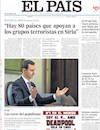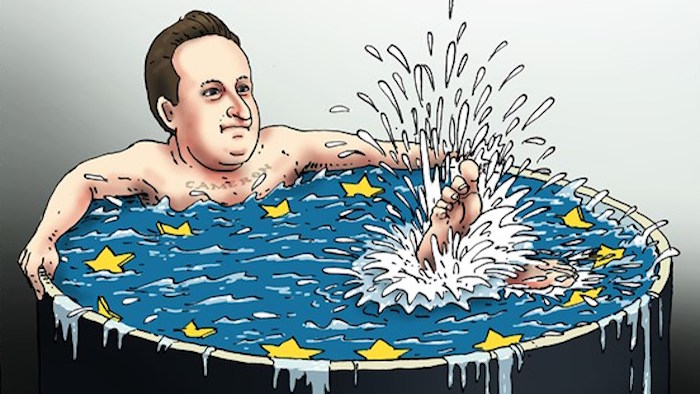Europe can breathe “a sigh of relief after the agreement over Brexit”, but La Stampa’s columnist Stefano Stefanini argues that, should the referendum end with –

the UK staying in the Union, we will definitely have a two-speed, or multiple-speed Europe. The weakening of certain constraints will be contagious for a number of other countries, even if not necessarily with the ‘take it or leave’ approach that London was able to impose. A good number of countries, namely those in the eurozone, will be able to continue down the path of ‘more Europe’. They must make sure not to force the hands of voters who do not want ‘too much Europe’. The Brits are not alone in their euro-scepticism.
“Cameron arrived in Brussels on Thursday afternoon to fight for ‘the UK’. And how he fought. A long day and night. He finally got his agreement, and a victory. He had 27 EU leaders on his side, almost the entire continent, argue Arie Elshout and Marc Peeperkorn in a joint editorial in De Morgen that also features in De Volkskrant. But, they add,

there is now an even greater challenge: convincing 63 million insular Brits, who count in their ranks many eurosceptics and sworn enemies of the EU. [...] He is in a good position following his success in Brussels. He knows how to win elections, as he proved in 2015. But, as Enda Kenny, his [Irish] counterpart, has warned him, he now has to deal with a referendum. This is the most difficult form of popular consultation, since it is an opportunity for a grouchy electorate to pull the rug from under his feet.
David Cameron has imposed his will. The European Union, in an attempt to avoid imploding, has made concessions that go “much too far”: a special status for the UK, new privileges for London and “a definitive ‘goodbye’ to a European federal state,” Eric Bonse from the Tageszeitung argues. And he expresses astonishment that Angela Merkel has let it happen:

No one can be happy about this. Because with its so-called ‘fair deal’ Europe is actually set to become less fair, less social, less open. Employees coming from Central Europe will be victims of discrimination, because they will not benefit from the same social rights as British citizens in the UK. [...] It is incomprehensible that Angela Merkel has accepted this horse trading. Normally she sticks to her principles. In the refugee crisis she stressed the importance of solidarity. But when she does business with the UK, which has rejected solidarity with Europe even more unabashedly than Poland or Hungary, she shuts her eyes. Noble principles have been sacrificed for Realpolitik.
Der Spiegel denounces not only David Cameron’s attitude, but also the drama played out by EU during the latest European summit in Brussels:

Look, I’ve fought, I done everything to win privileges for our country: David Cameron has got what he wanted – concessions from the EU and the drama that went along with that. Now, he can portray himself as the big winner from a tough negotiation battle. [...] It is the Cameron-Show that everybody was expecting. In the face of so many crises, nobody in the EU wants the Brits to leave and weaken the Union even more. That is why [...] EU heads of state and government have put on a little show – despite the fact an agreement was certain.
Anna Słojewska reckons in Rzeczpospolita that “it is notably Polish workers and their children who will pay the price of the concessions made to David Cameron.” She adds that Beta Szydło, the Polish Prime Minister, has played an important role in the negotiation of the social package which was settled with –

a compromise. The agreement means that London can limit allowances made to people on the lowest incomes for seven years. [...] Family allowances can be reduced if the child in question is at school in Poland. [...] The EU would not be as strong without the UK, even if it would be a more coherent entity. London has traditionally stood back from full integration: the country did not want the euro, is not in Schengen and benefits from opt-outs with regard to domestic affairs.
For El País, “it is a good thing for the UK to be able to remain within the EU, but not at the expense of its values.” In its editorial, the newspaper argues that

since its entry into the Common Market, the UK has been a mistrustful, divisive and unhelpful partner. But also a strict and diligent enactor of its commitments. [...] The good will displayed by the EU’s member states over this summit has therefore not been misplaced. But it is one thing to be well disposed. It is another very different thing to pay a high and unjustified price to keep hold of a capricious partner. And there is no guarantee that the UK will stay, given the reactions of certain notorious eurosceptics [to the deal]. The price is too high, because it is not simply a question of giving exceptions to one country: they could well spread to other countries to the detriment of the group’s cohesion.
Was this article useful? If so we are delighted!
It is freely available because we believe that the right to free and independent information is essential for democracy. But this right is not guaranteed forever, and independence comes at a cost. We need your support in order to continue publishing independent, multilingual news for all Europeans.
Discover our subscription offers and their exclusive benefits and become a member of our community now!












